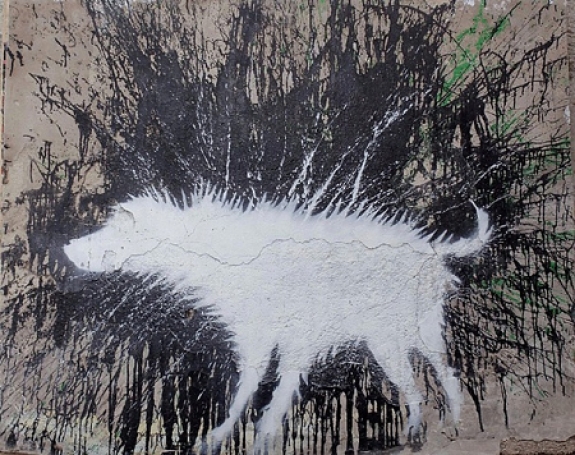Yesterday, Artnet Magazine reported on the controversy surrounding the decision by Keszler Gallery and Bankrobber Gallery to bring two Banksy stencils from Bethlehem to the Southampton Village Power Plant, where an exhibition of reconstituted street works and prints opened Aug. 20, 2011. Banksy fans argued that the artist intended the works for the West Bank and the galleries had no right to remove them. What’s more, only one of the seven works on view, Banksy, Laugh Now, 2002, originally a commission for a nightclub in Brighton, has been certified by Pest Control, Banksy’s authentication office, according to Keszler Gallery.
In an email today, Pest Control said that it has not authenticated any of the Banksy Street Art works in the exhibition. As a rule, Pest Control refuses to evaluate any Banksy works that have been “removed from their original context.” The Pest Control spokesperson did not know if Keszler Gallery or its collaborator, Bankrobber Gallery in London, had received permission from local building owners in Bethlehem to remove the works.
Ultimately, the office issued an admonishment to the gallery: “We have warned Mr. Keszler of the serious implications of selling unauthenticated works but he seems to not care. We have no doubt that these works will come back to haunt Mr. Keszler.”
So are the galleries worried? “Not in the slightest,” said Robin Barton, owner of the London-based Bankrobber Gallery. “The works are completely represented in timeline photography, and they appear on Banksy’s website. The evidence has to be bulletproof, if you’ll excuse the pun, to do something like this.”
Besides, the galleries did not themselves physically remove the works from their original sites as originally thought, Barton said. Rather, several years ago a group of Palestinian entrepreneurs paid the owners of the properties -- a local butcher in the case of Stop + Search and the county jurisdiction for Wet Dog, which was stenciled on a highway bus stop. According to Barton, the Palestinian owners excavated the works and had intended to sell them on eBay. Instead, they ended up abandoning them three years ago in a stone mason’s yard (outside of public view) when they realized it would be too difficult to move the two-and-a-half-ton works across tightly monitored border controls. “The whole project just overwhelmed them,” Barton said.



